人教版七年级下册英语10单元知识点总结及练习题
人教版七年级下册英语Unit 10 单元知识梳理与练习
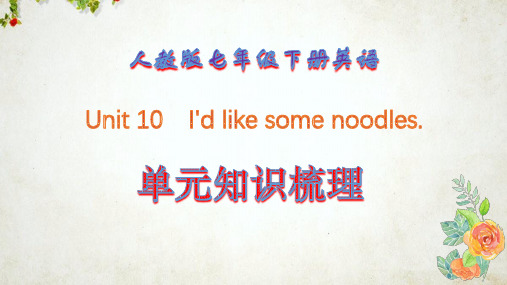
【拓展】如果不可数名词前有复数名词短 语修饰时,谓语 动词须用复数形式。 如:房间里有两袋子大米。
_T_h__er_e_ _a_r_e_ two bags of rice in the room.
二、可数名词与不可数名词
名词按其所表示的事物的性质可分为可数名词和不可数名词。
可数名词有复数形式, 不可数名词一般无复数形式
(一) 可数名词 从名词的类别看: 个体名词和集体名词是可数名词。可数名 词单数形式受不定冠词a/an修饰, 可数名词的复数形式变化如下: 1. 一般情况下, 在名词后加-s构成。 例如: desk→desks; map→maps 2. 以s; x; sh; ch结尾的词, 在名词后加-es构成。 例如: watch→watches; bus→buses 3. 以“辅音字母+y”结尾的词, 先变y为i, 再加-es。 例如: family→families; baby→babies
5. If he or she blows out all the candles in one go, the wish will come true. 如果他(她)一口气把蜡烛全部吹灭的话,许的愿望便会成真。
1) in one go 相当于汉语中的“同一次”,“一次性地”,其中的介 词还可用at,即at one go。例如:
19.我还不确定。 19.I'm not sure yet.
20.什么种类的面条 20.what kind of noodles
21.牛肉土豆面
Unit10知识清单及练习人教版七年级英语下册

人教版英语七年级下册Unit 10知识清单及练习一、必背短语及搭配1.would like + n. 想要… = want + n.2.would like to do 想要做某事= want to do3.take one’s order 为某人点菜4.one large bowl of… 一大碗…5.around the world 世界各地6.make a wish 许愿7.blow out 吹灭8.in one go 一口气,一次性地e true 实现10.get popular 变得流行11.cut up 切碎12.a symbol of long life 长寿的象征13.bring good luck to sb. 给某人带来好运bring sth. to sb. 带某物给某人14.make sb. do 让某人做某事15.be short of… 缺少…16.put on 戴上,穿上17.ask (sb.) for sth. (向某人)寻求…二、知识点辨析●the number of… / a number of…1. the number of…“…的数量”the number of +名词复数+动词单数The number of students in our class is 50.2. a number of… “大量的…”a number of +名词复数+动词复数 A number of students in our class are going to the park.三、句型would like想要1、与want意思相近,但是比want语气委婉、客气,常用来表示请求或建议2、would like 可以和任何人称连用,没有人称和数的变化。
当它与人称代词连用时,可以缩写成’d like(I’d like,He’d like,She’d like,We’d like,They’d like等)3、短语:would like sth 想要某物would like to do sth 想要做某事would like sb. to do sth 想要某人做某事4、句型:(1)肯定句:主语+would like +sth 主语+would like +to do sth(2)否定句:主语+would +not+ like +sth 主语+would +not+like +to do sth(3)一般疑问句:Would you like sth. ? 肯定回答:Yes, please. 否定回答:No, thanks.Would you like to do sth. ? 肯定回答:Yes, I’d like/ove to.否定回答:Sorry, I..../或I’d like/ove to, but...(4)特殊疑问句:What would sb. like?某人想要什么?what kind of ... would sb. like?某人想要什么种类的....?what size... would you like?某人想要什么大小/尺码的....?●知识点还有一类名词即可做可数名词也可作不可数名词,意义和用法不同食物类可数性分类1)、可数名词复数变化规则:规则变化不规则变化(1)单词变形:child-children,man-men,foot-feet ,tooth-teeth(2)单复数同形:deer鹿;sheep羊;Chinese中国人;Japanese日本人(3)集体名词:以单数形式出现,实则复数意思(作主语时,谓语动词要用复数形式)。
新目标英语七年级下第10单元知识点讲解及习题

2013—2014 新版人教版七年级下英语unit10复习与练习Unit 10 I’d like some noodles1. would like“想要”,相当于want, 用法亦同want,但比want委婉。
1)want/would like sth. 想要某物I’d like some noodles2)want/would like to do sth. 想要做某事I’d like to play the piano 我想要弹钢琴。
3)want/would like sb. to do sth. 想要某人做某事I would like him to help me. 我想要他帮助我。
X k B 1 . c o m6)would you like sth. 你想要某物吗?(委婉地询问对方的要求时的用语)肯定回答:Yes, please.否定回答:No, thanks.7) Would you like to do sth?你想要/愿意做某事吗?(向对方有礼貌地提出建议或邀请)肯定回答:Yes, I’d like/love to. 是的,我愿意。
否定回答:Sorry, + 原因。
Would you like to go shopping with us? 你想要/愿意和我们一起去购物吗?Yes, I’d like/love to. 是的,我愿意。
Sorry, I have a lot of homework to do.2. noodle “面条”,可数名词,复数noodles。
X|k | B | 1 . c|O |m3.What kind of….would you like?你想要那种……?kind1)种类①a kind of....一种......②many kinds of....多种.....③all kinds of....各种各样的......2)仁慈的,和蔼的,好意的,友爱的①He is a kind man.②He is kind to everyone.他与人为善。
人教版英语七年级下册Unit10单元知识点总结及同步练习题(附答案)

人教版英语七年级下册Unit10单元知识点总结及同步练习题Unit 10 I’d like some noodles.知识点总结◆短语归纳1. would like 想要2. take one’s order 点菜3. beef soup 牛肉汤4. one bowl of… 一碗……5. what size 什么尺寸6. mapo tofu with rice带米饭的麻婆豆腐7. what kind 什么种类8. small / medium / large bowl 小/ 中/大碗9. green tea 绿茶10. orange juice 橘汁11. around the world 世界各地12. birthday cake 生日蛋糕13. the number of… 的数量14. make a wish 许个愿望15. blow out 吹灭16. in one go 一口气17. come true 实现18. cut up 切碎◆用法集萃1. would like + sth. 想要某物2. would like + to do sth. 想要做某事3. Why don’t you + do sth.? 何不做某事?4. the number of + 名词复数……的数量,a number of+名词复数许多……◆重点句型讲解1. I’d like some noodles. 我想要一些面条。
【句析】本句是简单句。
【考点】would like(表示意愿)愿意;喜欢【用法】相当于want,但语气比want委婉。
(1)would like中的would常缩写为’d。
would like可用于任何人称,没有人称和数的变化。
其后可以接名词、代词。
Would you like sth.? 意为“你想要……吗?”肯定回答:Yes, please. / OK. / All right.等。
否定回答:No, thanks.(2)would like后可以接动词不定式,构成would like to do sth.,意为“想要做某事”。
人教版初一英语七年级下册Unit 10 知识点总结及单元测试卷(附答案)
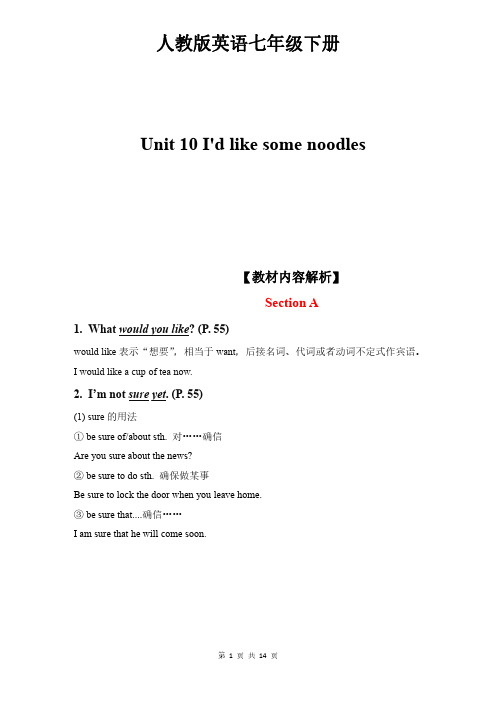
人教版英语七年级下册Unit10I'd like some noodles【教材内容解析】Section A1.What would you like?(P.55)would like表示“想要”,相当于want,后接名词、代词或者动词不定式作宾语。
I would like a cup of tea now.2.I’m not sure yet.(P.55)(1)sure的用法①be sure of/about sth.对……确信Are you sure about the news?②be sure to do sth.确保做某事Be sure to lock the door when you leave home.③be sure that....确信……I am sure that he will come soon.④make sure that...确保……Make sure that you can finish the job on time.(2)yet此处用作副词,表示“还、仍然”,常用于否定句和疑问句中。
Is everything ready yet?3.---Are there any vegetables in the beef noodles?---Yes,there are some tomatoes.(P.55)some一般用在肯定句中。
There are some birds in the tree.any一般用在否定句、疑问句中。
Do you have any questions?特殊情况:some可以用在疑问句中,表达“建议、请求、邀请”并希望得到对方的肯定回答Would you like some tea?Can I have some oranges?4.May I take your order?(P.56)本句是服务员询问顾客是否点餐的常用交际语,order此处用作名词,表示“点菜”。
unit10单元知识点归纳总结及配套练习人教版英语七年级下册

UnitlO rd like some noodles.I . Revision(复习)II・Presentation重点,难点,考点,热点呈现)重点短语special I特色菜]点餐想要某物牛肉面牛肉汤一碗beef and carrot noodles牛肉胡萝卜面羊肉面tomato and egg soup西红柿鸡蛋汤green tea绿茶全世界birthday cakes 生R 蛋糕的数量许愿吹灭 _次性实现点菜流行;受欢迎切碎的象征 .给..…带来......长寿面in my porridge在我的粥里缺乏..... 给…带来好运the birthday person过生日的这个人在某人生日的时候在不同的国家别着急让某人的愿望实现重点句型1.-What would you like?你想要什么? "I'm not sure yet.我还不确定。
2.May I take your order?我能帮您点菜吗?3.What size would you like?你们要什么号的?4.What kind of noodles would you like?你想要哪种面?5.We have large, medium, and small bowls.我们有大,中,小碗。
6.In many countries, people have birthday cakes with candles.在许多国家,人们吃带有生口蜡烛的蛋糕。
7.The number of the candles is the person's age.蜡烛的根数就是过生日的人的岁数。
8.The birthday person must make a wish and blow out the candles.过生H 的人必须许个愿,吹灭蜡烛。
9.If he or she blows out all the candles in one go, the wish will come true.如果他或她一次吹灭所有蜡烛,梦想就会实现。
人教版英语七年级下册第十单元短语语法知识点总结汇编
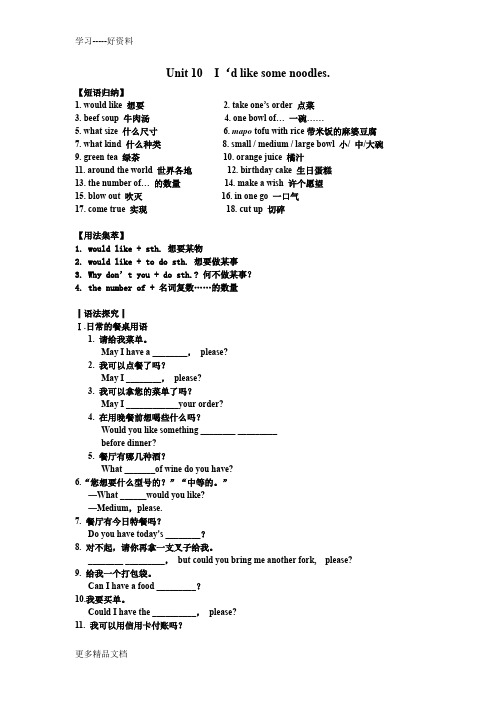
Unit 10I‘d like some noodles.【短语归纳】1. would like 想要2. take one’s order 点菜3. beef soup 牛肉汤4. one bowl of… 一碗……5. what size 什么尺寸6. mapo tofu with rice带米饭的麻婆豆腐7. what kind 什么种类8. small / medium / large bowl 小/ 中/大碗9. green tea 绿茶10. orange juice 橘汁11. around the world 世界各地12. birthday cake 生日蛋糕13. the number of… 的数量14. make a wish 许个愿望15. blow out 吹灭16. in one go 一口气17. come true 实现18. cut up 切碎【用法集萃】1. would like + sth. 想要某物2. would like + to do sth. 想要做某事3. Why don’t you + do sth.? 何不做某事?4. the number of + 名词复数……的数量┃语法探究┃Ⅰ.日常的餐桌用语1. 请给我菜单。
May I have a ________,please?2. 我可以点餐了吗?May I ________,please?3. 我可以拿您的菜单了吗?May I ____________your order?4. 在用晚餐前想喝些什么吗?Would you like something ________ _________before dinner?5. 餐厅有哪几种酒?What _______of wine do you have?6.“您想要什么型号的?”“中等的。
”—What ______would you like?—Medium,please.7. 餐厅有今日特餐吗?Do you have today's ________?8. 对不起,请你再拿一支叉子给我。
人教版七年级英语下册单元知识点总结(全册)
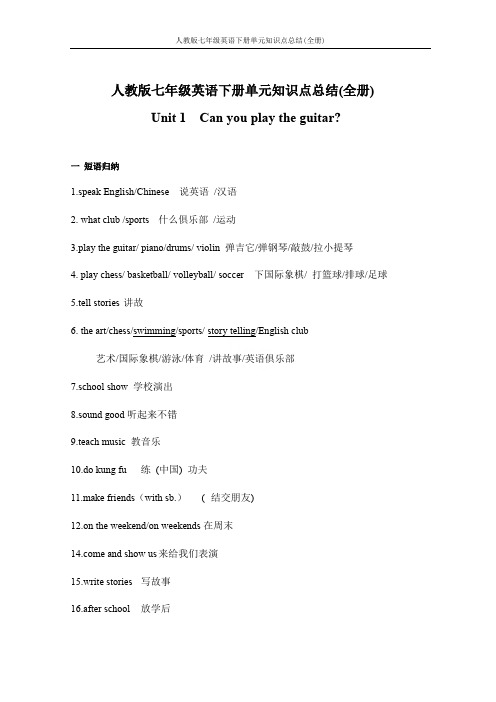
人教版七年级英语下册单元知识点总结(全册)Unit 1 Can you play the guitar?一短语归纳1.speak English/Chinese 说英语/汉语2. what club /sports什么俱乐部/运动3.play the guitar/ piano/drums/ violin 弹吉它/弹钢琴/敲鼓/拉小提琴4. play chess/ basketball/ volleyball/ soccer 下国际象棋/ 打篮球/排球/足球5.tell stories讲故6. the art/chess/swimming/sports/ story telling/English club艺术/国际象棋/游泳/体育/讲故事/英语俱乐部7.school show 学校演出8.sound good听起来不错9.teach music 教音乐10.do kung fu练(中国) 功夫11.make friends(with sb.)(结交朋友)12.on the weekend/on weekends在周末e and show us来给我们表演15.write stories写故事16.after school放学后17.English-speaking students说英语的学生18.play games 做游戏19.the Students’ Sports Center学生运动中心20.at the old people’s home在老人之家21.be in our school music festival 参加学校音乐节22.jion the music club加入音乐俱乐部二用法集萃1. play +棋类/球类下……棋,打……球2. play the +乐器弹/拉……乐器3. be good at doing sth.擅长做某事be good for.. 对… 有好处be good /kind to … 对… 友好4. be good with sb. 和某人相处地好; 善于应付(处理)…5. need(sb./sth.)to do… 需要(某人/某物)做….6. can + 动词原形能/会做某事7. a little + 不可数名词: 一点儿……9. like to do sth.或like doing sth. 喜欢做某事10.want to do…想做……11.What about…?…怎么样?(后面接Ving/代词/名词)12. talk用法: talk to/with sb. 跟某人说话talk about sth. 谈论某事tell 用法:tell sb sth. 告诉某人某事tell sb to do sth 告诉某人去做某事tell stories 讲故事say用法:say直接加说话的内容/itspeak用法:speak +语言13.help sb. with sth在某方面帮助某人= help sb.(to)do sth14.be free /busy有空/很忙15. call sb. at+号码拨打某人的……号码16. be in=join …成为…中的一员(P6)17.want …for the school show为学校表演招聘……三典句必背1. Can you draw? 你会画画吗?Yes, I can. / No, I can’t.是,我会。
人教版英语七年级下册单元Unit 10 知识点+测试卷+思维导图
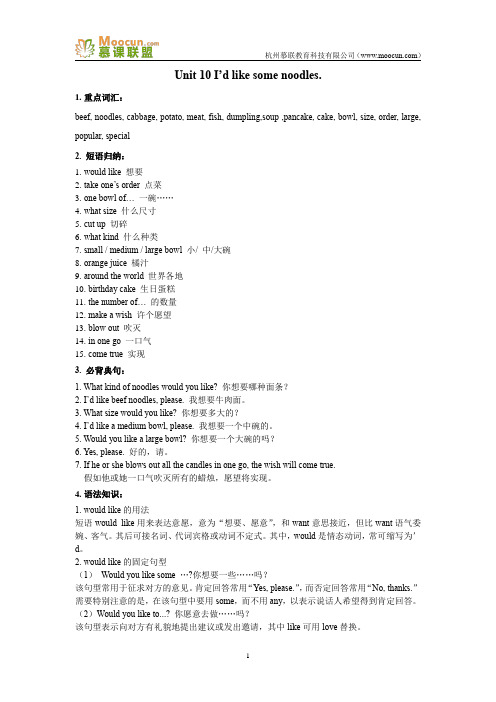
Unit 10 I’d like some noodles.1.重点词汇:beef, noodles, cabbage, potato, meat, fish, dumpling,soup ,pancake, cake, bowl, size, order, large, popular, special2. 短语归纳:1.would like 想要2.take one’s order 点菜3.one bowl of… 一碗……4.what size 什么尺寸5.cut up 切碎6.what kind 什么种类7.small / medium / large bowl 小/ 中/大碗8.orange juice 橘汁9.around the world 世界各地10.birthday cake 生日蛋糕11.the number of… 的数量12.make a wish 许个愿望13.blow out 吹灭14.in one go 一口气e true 实现3. 必背典句:1. What kind of noodles would you like? 你想要哪种面条?2. I’d like beef noodles, please. 我想要牛肉面。
3. What size would you like? 你想要多大的?4. I’d like a medium bowl, please. 我想要一个中碗的。
5. Would you like a large bowl? 你想要一个大碗的吗?6. Yes, please. 好的,请。
7. If he or she blows out all the candles in one go, the wish will come true.假如他或她一口气吹灭所有的蜡烛,愿望将实现。
4.语法知识:1. would like的用法短语would like用来表达意愿,意为“想要、愿意”,和want意思接近,但比want语气委婉、客气。
人教版七年级下册英语第十单元重点短语与句型汉译英专项练习
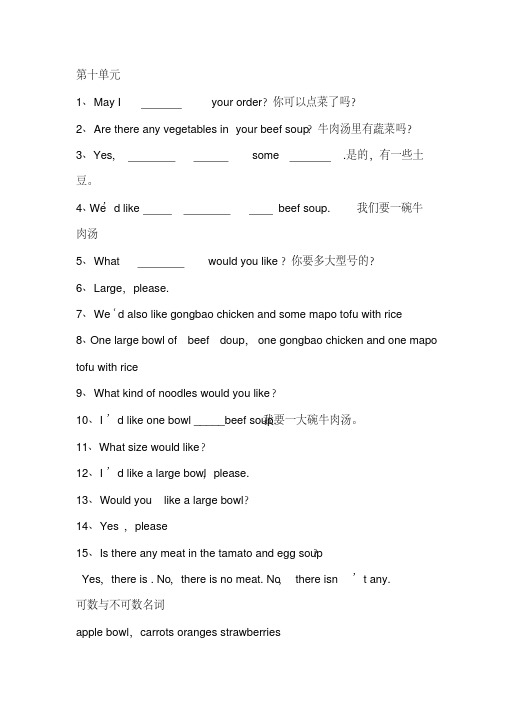
第十单元1、May I your order?你可以点菜了吗?2、Are there any vegetables in your beef soup?牛肉汤里有蔬菜吗?3、Yes,some .是的,有一些土豆。
4、We’d like beef soup. 我们要一碗牛肉汤5、What would you like?你要多大型号的?6、Large,please.7、We‘d also like gongbao chicken and some mapo tofu with rice8、One large bowl of beef doup,one gongbao chicken and one mapo tofu with rice9、What kind of noodles would you like?我要一大碗牛肉汤。
10、I’d like one bowl _____beef soup.11、What size would like?12、I’d like a large bowl ,please.13、Would you like a large bowl?14、Yes ,please15、Is there any meat in the tamato and egg soup?Yes,there is . No,there is no meat. No,there isn’t any.可数与不可数名词apple bowl,carrots oranges strawberriesmutton meat milk water beefchicken salad ice cream cabbagebirthday food around the world16、What would people like to eat their birthday?人们在生日时愿意吃什么?17、The answer would be different in different .在不同的国家,答案会是不同的。
人教版英语七年级下册单元Unit 10 知识点+测试卷+思维导图

Unit 10 I’d like some noodles.1.重点词汇:beef, noodles, cabbage, potato, meat, fish, dumpling,soup ,pancake, cake, bowl, size, order, large, popular, special2. 短语归纳:1.would like 想要2.take one’s order 点菜3.one bowl of… 一碗……4.what size 什么尺寸5.cut up 切碎6.what kind 什么种类7.small / medium / large bowl 小/ 中/大碗8.orange juice 橘汁9.around the world 世界各地10.birthday cake 生日蛋糕11.the number of… 的数量12.make a wish 许个愿望13.blow out 吹灭14.in one go 一口气e true 实现3. 必背典句:1. What kind of noodles would you like? 你想要哪种面条?2. I’d like beef noodles, please. 我想要牛肉面。
3. What size would you like? 你想要多大的?4. I’d like a medium bowl, please. 我想要一个中碗的。
5. Would you like a large bowl? 你想要一个大碗的吗?6. Yes, please. 好的,请。
7. If he or she blows out all the candles in one go, the wish will come true.假如他或她一口气吹灭所有的蜡烛,愿望将实现。
4.语法知识:1. would like的用法短语would like用来表达意愿,意为“想要、愿意”,和want意思接近,但比want语气委婉、客气。
人教新目标七年级英语下册Unit 10 知识点总结和同步练习(含答案)

Unit 10 I’d like some noodles.【短语归纳】1. would like 想要2. take one’s order 点菜3. beef soup 牛肉汤4. one bowl of… 一碗……5. what size 什么尺寸6. mapo tofu with rice带米饭的麻婆豆腐7. what kind 什么种类8. small / medium / large bowl 小/ 中/大碗9. green tea 绿茶10. orange juice 橘汁11. around the world 世界各地12. birthday cake 生日蛋糕13. the number of… 的数量14. make a wish 许个愿望15. blow out 吹灭16. in one go 一口气17. come true 实现18. cut up 切碎【典句必背】1. What kind of noodles would you like? 你想要哪种面条?2. I’d like beef noodles, please. 我想要牛肉面。
3. What size would you like? 你想要多大的?4. I’d like a medium bowl, please. 我想要一个中碗的。
5. Would you like a large bowl? 你想要一个大碗的吗?6. Yes, please. 好吧。
7. If he or she blows out all the candles in one to, the wish will come true.假如他或她一口气吹灭所有的蜡烛,愿望将实现。
【知识点】1,名词可分为可数名词和不可数名词(不可数名词作主语,谓语动词用单数)。
可数名词又分单数和复数。
○1一般+s;○2以-s,-x,-ch,sh结尾的名词+es;○3辅音+y,把y变i,再+es;○4以-o结尾的,有生命的+es(negro—negroes;hero —heroes;tomato—tomatoes;potato—potatoes);无生命的+s;⑤以f,fe 结尾的名词,改f,fe为v+es(leaf—leaves;knife—knives)(例外:roofs,chiefs)⑥单复数同形:sheep,deer.不规则变化:man—men;woman—women;child—children;foot—feet;tooth—teeth等2,would like sth. 想要某物Would you like some …?你想要一些……吗?——Yes, please./ ——No, thanks.would like to do sth. “想要做某事”。
Unit 10 单元知识点总结课件 七年级英语下册(人教版)
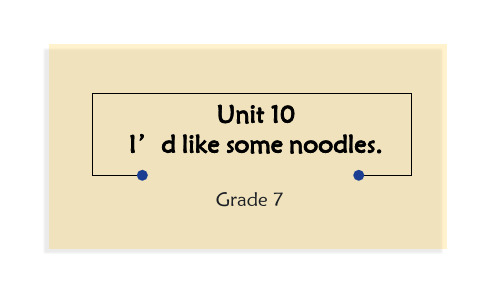
apple trees
(1) 规则:起修饰作用的名 词一般为单数(adj. 无单复 数之分)
tomato and egg noodles a shoe shop two shoe shops
2.定语的数
(2)例外
man 和 woman 修饰名 词时单复数与被修饰
词保持一致 a woman teacher two women teachers
2. The little girl asked her mother to buy her a nice pair of ____________, so her
mother went to some ____________ stores.
A. shoes; shoes
B. shoes; shoe
C. shoe;
3. All the ____________ teachers and ____________ students are having an important
meeting now.
A. women; girl
B. woman; girl
C. woman; girls
4. ——What kind of dumplings would you like?
many, a lot of Some apples are on the table.
2.不可数名词: 不可以计数(肉
类,液体)
谓语动词用单数/三单
The meat is on the table. The meat tastes delicious.
可用量词表数量(量词有单复数);谓语动词 要和量词的数保持一致
Would like some ...?
最新人教版七年级下册英语10单元知识点总结及练习题.docx
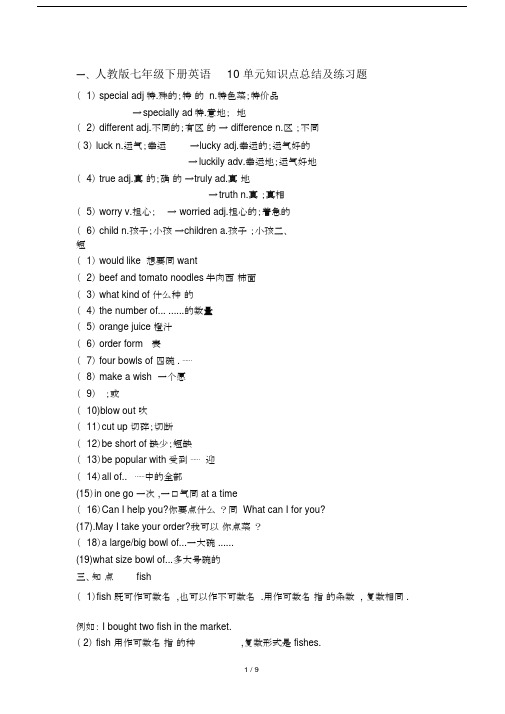
一、人教版七年级下册英语10 单元知识点总结及练习题(1) special adj特.殊的;特的 n.特色菜;特价品→specially ad特.意地;地(2) different adj.不同的;有区的→ difference n.区;不同( 3) luck n.运气;幸运→lucky adj.幸运的;运气好的→luckily adv.幸运地;运气好地(4) true adj.真的;确的→truly ad.真地→truth n.真;真相(5) worry v.担心;→ worried adj.担心的;着急的(6) child n.孩子;小孩→children a.孩子;小孩二、短(1) would like 想要同 want(2) beef and tomato noodles牛肉西柿面(3) what kind of 什么种的(4) the number of... ......的数量(5) orange juice 橙汁(6) order form 表(7) four bowls of 四碗 . ⋯⋯(8) make a wish 一个愿(9);或(10)blow out 吹(11)cut up 切碎;切断(12)be short of 缺少;短缺(13)be popular with 受到⋯⋯迎(14)all of.. ⋯⋯中的全部(15)in one go 一次 ,一口气同 at a time(16)Can I help you?你要点什么?同 What can I for you?(17).May I take your order?我可以你点菜?(18)a large/big bowl of...一大碗 ......(19)what size bowl of...多大号碗的三、知点fish(1)fish 既可作可数名 ,也可以作不可数名 .用作可数名指的条数 ,复数相同 .例如: I bought two fish in the market.( 2) fish 用作可数名指的种,复数形式是 fishes.例如: There are many kinds of fishes in the lake.( 3) fish 作不可数名 ,意“ 肉”.Do you like fish or eggs?你喜吃肉是蛋?( 4) fish 可以作 ,意“ ”.Let ’ s go fishing tomorrow. 我明天去吧 .四、知点special( 1) special 作名 ,意“特色菜、特价品、特的事物”等.例如: The train is a special for the football game.The menu changes regularly and there are daily specials to choose from.( 2) special 可以做形容 ,意“特殊的 , 特的 ,特色的”.His accent is quite special.五、知点order(1)order 作名 ,意“点菜”,是可数名; take one’ sorder 意“点菜”.例如: May I take your order?拓展: order 作名 ,可以表示“ 序、次序”例.如:The names are in alphabetical order.My mother likes order in our home.(2) order 作 ,意“命令、要求、物”等.例如:The police ordered them to wait right there.Shall I order a taxi for you?六、知点would like + sth. / to do sth. / sb. to do sth 想 /想要 /愿意⋯=want to do sth.---What would you like to drink? --- I ’d like a cupof tea.She wouldn ’t like to do that.I ’d like you to go there with me.七、知点blowblow 不及物 ,意“吹”; blow out 意“吹”后.接名 ,名可以放在的中也可以放在 out 的后面;后接代 ,代必放在的中 . 例如:The wind blew out the candle. 吹了蜡 .The wind blew the match out. 把火柴吹了 .The wind blew it out. 把它吹了 .八、知点make sb. /sth. do sth. 意“使某人做某事”.make sth/sb+adj 意“使/某人(某物)怎么”例.如:The boss makes us work eleven hours a day.She often makes him happy.九、知点a number of 表示“ 多⋯⋯”+名复数 +复数A number of students of our school have read that magazine.A number of wild animals have been found in the forest.the number of 表示“⋯⋯的数量”+名复数 +数 .The number of students in our school is 1,500.十、知点what size 尺寸、大小 , “多大尺寸 ,什么号的” .size是名 ,可以表示物品的大小、尺寸、号 .1)---你要多大号的鞋? ---我要 38 的 .---What size shoes would you like?---I ’d like Size 38.2)件T恤有点小 ,你能我一件大号的?This T-shirt is a little small for me. Would you like to show me a larger size?十一、知点法:名复数的化律一、名复数的构成方法及音1.一般情况加–s:例如: map—maps; drink—drinks; roof—roofs; park—parks;例如: boy—boys; show— shows; zoo—zoos;panda— pandas; car— cars; singer—singers;例如: girl — girls; pen— pens; friend— friends; bag— bags; lab — labs; room —rooms;2.以 s, sh, ch, x等尾加–es, 如:bus—buses watch— watches box—boxes brush—brushesmatch—matches fish—fishes3.以音字母 +y 尾 , y i,再加 es.例如:baby—babies; strawberry—strawberries country— countries; story— stories family —families; city —cities但以 y 尾的有名 ,或元音字母 +y 尾的名复数 ,直接加 s复数 .two Marys the Henrysboy—boys; monkey— monkeys;play—plays; holiday—holidays4.以 o 尾的名 ,复数:1)无生命的加 s, 如:photo---photos, zoo---zoos piano---pianos, radio---radios ;2)有生命的加 es, 如:potato---potatoes, tomato---tomatoes, hero---heroes(英雄) ,5.以 f 或 fe尾的名复数:1)加 s,如: belief---beliefs(信仰 ,信任)roof---roofs(房)scarf---scarfs / scarves(巾)2)去 f, fe 加 ves,如:half---halves (半) knife---knives leaf---leaves wolf---wolveswife---wives life---lives (生命)thief---thieves shelf---shelves (架子)self---selves(自己)二、名复数的不化1.child---children,foot---feet,tooth---teeth, goose---g eese() ,mouse---mice(小老鼠) ,man---men,woman---women,注意:由一个加man 或 woman 构成的合成 ,其复数形式也是-men 和-women.an Englishman--two Englishmen.但 German不是合成 ,所以复数形式 Germans.2.复同形 .如:deer鹿 ,sheep 羊Chinese---Chinese; Japanese---Japanese3.集体名 ,以数形式出 ,但复数 .people police cattle 等本身就是复数 ,不能 a people(一个人) ,a police,a cattle;(但是可以有: a people : 一个民族)但在表达“一个⋯” ,可以 a person,a policeman,a head of cattle .4.以 s 尾 ,仍数的名 ,如:1)maths(英:数学) ,politics(政治) ,physics(物理)等学科名 ,然后有 -s,但是数形式 .2)news 不可数名 .3)the United States,the United Nations 数 .4)以复数形式出的名,名 ,,志名 ,也可数 .例5.表示由两部分构成的西,只有复数形式 .glasses; trousers; pants; shorts; shoes;s() scissors(剪刀)等 ,若表达具体数目 ,要借助数量pair( ,双) ; suit(套) .a pair of glasses 一副眼“ ”;two pairs of trousers 两条“子”等.6.另外还有一些名词 ,其复数形式有时可表示特别意思 .如:goods货物 ,waters 水域 ,fishes(各种)鱼 .三、表示“某国人”的单复数变化:1.加-s 的词:German---Germans (德国人)Russian---Russians(俄罗斯人)Roman---Romans (罗马人)American---AmericansArab---Arabs (阿拉伯人)2.有变化的词有:Frenchman---Frenchmen; Englishman-Englishmen四、合成名词变为复数时:1.第一个或最后一个词变成复数.girl friend---girl friends(女朋友)boy student---boy students (男学生)grown-up---grown-ups (成年人)passer-by---passers-by(过路人)son-in-law ---sons-in-law(女婿)2.构成合成名词的两个词都要变为复数.man servant---men servants(男仆人) woman teacher---women teachersman doctor --- men doctors可数名词和不可数名词①本单元的可数名词:eggs, apples, strawberries, oranges, onions, dumplings, drinks, carrots,②本单元的不可数名词: rice, porridge, beef, mutton, broccoli, juice③本单元的既是可数又是不可数的名词;chicken, salad, ice cream, cabbage, soup, dessert, fish一、用所给词的适当形式填空1.Many children like to eat __candies______(candy).2.He is so __lucky______(luck) this time.He gets the ticket.3.The wind is __blowing______(blow) heavily.It's going to rain.4.I'd like two __cups______(cup) of green tea.5.There __is______(be) some beef and tomatoes in the noodles,do you like the noodles with beef and __tomatoes______(tomato)?6. They would like __to see_______(see) the animals in the zoo.7.Let them ____help________(help) us with English.8.Would you like some juice _to drink____(drink)?9.There are some __tomatoes__(tomato) and _porridge_ (porridge) on the table.10.What about _swimming_ (swim) in the pool?二、单项选择( C ) 1. ---Would you like something to eat?---_______. I’ m not hungry.A. Yes, I’ d like toB. Yes, I’ d love toC. No, thanks( A ) 2. ---_______? ---I ’ d like a cup of tea.A. Would you like some teaB. Can you help meC. Do you like tea( B ) 3. ---Do you want a big watermelon(西瓜 ) or a _______ one?---A big one, please.A. thinB. smallC. heavy(B)4.He is too hungry and he wants two _______.A. bowl of noodlesB. bowls of noodlesC. bowls of noodle(A)5.---What _______ coat would you like?---A medium one.A. sizeB. kindC. color( C ) 6. ---Let ’dos something at the party. What about _______?---No, I ’ dlike _______.A. to sing; to danceB. to sing; dancingC. singing; to dance(B)7.---Would you like green tea _______ juice?---I don ’ t like green tea _______ juice.A. and; andB. or; orC. and; or( C ) 8. Look! Some chicken _______ on the plate. And some eggs _______ in the bowl.A. is; isB. are; areC. is; are( A ) 9. I often eat some _______ and _______ on Sunday evenings.A. tomatoes; fishB. tomato; fishC. tomatoes; fishes( C ) 10. ---What size pizza _______ Lily like?---She _____ like a large pizza.A. does; isB. is; wouldC. would; would( D )11.---What size pizza would you like, small or medium ? ---__________.A.Small,pleaseB.Medium, pleaseC.Sorry, I don’ t knowD.Both A and B( C)12.---Can I help you ?---I ’ d like to drink ______.A.some orangesB.orangesC.some orangeD.orange juices( C)13.He ’ d like me_________ him_________ English.A.help, learnB.help, learningC.to help, learnD.to help learning( B)14.I can ’ t go with you because I have _________ to do.A. many homeworkB. much homeworkC. a lot homeworkD. a lot of homeworks( C )15.______ you like______ to eat?A. Are, somethingB. Are, anythingC. Would, somethingD. Would, anything( D )16.I’ m hungry. I would like ________ a large bowl of dumplings.A. haveB. eatC. eatingD. to eat( D )17. Would you like to go shopping with me? __________.A. No, I wouldn’Bt. Yes, I would C. Yes, I ’ d loveD. Yes, I’ved loto( A)18.My father’ideas are quite different mine, but I don’want to listen to him.A. fromB. asC. withD. for( B )19.—Who is your favorite singer,Mike?—TFBOYS. They are very boys and girls.A. proud ofB. popular withC. strict withD. worried about( C )20.— How many women doctors are there in your hospital?—them over twenty.A. number of; areB. The number of; areC. The number of; isD. A number of; is( A)21.there mutton and vegetables in the noodles?A. Is; anyB. Is; someC. Are; anyD. Are; some( A )22..—Would you like to help me with my English this evening?—. I’ m busy this evening. What about tomorrow morning?A. I ’ msorryB.I don’think soC. No problemD. Sounds like a good idea( C )23.The number of people in the city about seven million now.A. areB. hasC. isD. have( D )24.— Would you like to see a movie with me tonight?—. I have to do chores.A. Good luckB. Let’ s goC. No problemD. I ’ m afraid not( B)25.— Look! There some tomatoes in the basket—.Oh, how fresh! A. isB. are C. was D. were( B )26.— Is there juice in the glass?—Yes, there is.A. some; anyB. any; someC. some; someD. any; any( A )27.— Would you like some water?—. I am thirsty now.A. Yes, please.B. Great. I’ ll getCit..Sorry, I wouldn’D.t.No, thank you.( B )28. Julie would like TV.A. watchB. to watchC. watchingD. watches( A )29.We need to go shopping. There is juice left in the fridge.A. littleB. fewC. manyD. much( C)30..—would you want? — I ’ d like a large one.A. What kindB. What colorC. What sizeD. What language三 .完形填空I like eating rice, noodles, strawberries, ice cream, hamburgers and so on. Butmy favorite __16__ is dumplings. Every Sunday, my mother __17__ many dumplingsfor me. If she has __18__ time, I’ ll go to the supermarket to __19__ some. Dumplings look __20__ white boats(船). They are very delicious. __21__ my birthday every year,I usually help my mother make a lot of dumplings. Do you know the __22__?Because I often ask some friends to __23__ them with me. There are different kindsof __24__ and meat in them. My friends __25__ like to eat them very much.( A ) 16. A. food B. dessert C. fruit( C ) 17. A. do B. does C. makes( B ) 18. A. some B. no C. any( C ) 19. A. want B. order C. buy( C ) 20. A. for B. at C. like( B ) 21. A. In B. On C. About( C ) 22. A. kind B. size C. reason( A ) 23. A. eat B. drink C. like( C ) 24. A. noodles B. dumplings C. vegetables( A ) 25. A. all B. every C. both四.补全对话 .(10)A: Is that your pen pal, Sarah?A.He lives in Toronto.B: 41 _____B__________B.Yes,he is.A: Oh. What ’ s his name?B: His name is David. D.Is he from Canada?A: 42_______D__________ E.What does he want to be?F.An actor?B: No, he isn’ t. He ’ s from America.G.What does he do?A:43________G_________B: Oh, he ’ s a bank clerk. But he doesn’ t like his work.A:44________E__________B:He wants to be an actor.A: 45________F________ I don’ t think it’ s an exciting job. B: But I think it’ s very interesting.。
+Unit10单元复习练习题+2022-2023学年人教版七年级英语下册

人教版英语七年级下册Unit10单元复习练习题Ⅰ、单项选择,从A、B、C、D四个选项中,选出可以填入空白处的最佳选项。
1.—May I have your order? —_________.A. No, you can’tB. Have a good timeC. You, tooD. I’d like some rice, please2.The noodles with orange juice ______ only $1.5.A. isB. areC. forD. with3.—Would you like _______ beef?— No, thanks. I don’t have ________ money.A. some. some B .any, any C. some ,any D. any ,some4.There aren’t ________ specials here. Let’s go to another restaurant to eat the specials of the city.A. someB. severalC. anyD. yet5.We need onion and two tomatoes for dinner.A. aB. anC. theD. /6. —Please show me some more mutton. —Sure. __________.A. Give youB. Don’t say thatC. Thank youD. Her e you are7.—Would you like to eat a medium bowl of dumplings? — _______.A. Yes, I’d like to.B. I would love toC. Yes, please.D. Sorry.8. They bring good luck ________ the birthday person.A. ofB. aboutC. inD. to9.—What do you usually for breakfast?—A hamburger, an egg and some juice.A. haveB. eatC. drinkD. do10.Look! Some chicken ______ on the plate.And some eggs ______ in the bowl.A.is;is B.are;are C.is;are D.are;is11.The number of candles on the birthday cake _______ the person’s age.A. areB. isC. beD. was12.—Would you like some dumplings? —________.A. Yes, pleaseB. It’s interestingC. You’re welcomeD. No problem13.Here is your , sir. What would you like?A. reasonB. bookC. menuD. notebook14.There two bowls of rice on the table.A. areB. isC. haveD. has15.________ is your address?A. WhereB. WhichC. WhatD. How16.Many people eat very long noodles _______ their birthday. Because the y are thesymbol of long life.A. forB. inC. aboutD. of17.—Would you like ______ beef noodles? —Yes, please.A. someB. anyC. anD. another18. —What bowl of noodles would you like? —Large, please.A. priceB. kindC. sizeD. color19.Do you like noodles ______ chicken?A.with B.of C.in D.to20. Peter doesn’t like apples, chicken mutton.A. andB. withC. ofD. orⅠ、完形填空。
人教版七年级下册英语Unit10知识点梳理及语法讲义(学生版)

七年级下册英语Unit 10知识点与语法精讲精练词汇梳理(一)完成单词梳理:名词:1. (常用复数形式)面条 2. 羊肉 3. 牛肉4. 卷心菜;洋白菜5. 土豆;马铃薯6. 大小;尺码7. 碗8. 豆腐9. (可食用的)肉10. 饺子11. 粥;面糊12. 洋葱13. 鱼;鱼肉14. 烙饼;薄饼15. 世界16. 蛋糕17. 蜡烛18. 年龄19. 糖果20. 想法;主意动词:1. (表示意愿)愿意 2. 吹 3. 将要;会副词:1. (常用于否定句或疑问句)还;仍然连词:1. 如果形容词:1. 大号的;大的 2. 不同的 3. 幸运的4. 受欢迎的;普遍的兼类词:1. (n)特色菜;特价品(adj)特别的;特殊的2. (n/v)点菜;命令3. (n)答案(v)回答(二)词汇变形小结:1.noodle 面条(n.) →____________ (复数)2.potato 土豆;马铃薯(n.) →____________ (复数)3.special 特殊的(adj.) →____________ (adv.)特殊地4.different 不不不(adj.)→ ____________(adv.)不同地→ ____________(n.)差别;差异5.lucky 不不不(adj.) →____________(n.)不不→____________(adv.)不不不6.candy 不不(n.) → ____________(复数)【练一练】用所给词的适当形式填空1.My father wants ____________ (order) a large bowl of noodles now.2. They had some great ____________ (special) on the menu this evening.3. Chinese people say that red will bring good ____________ (lucky) in the New Year?4. What size bowl of ____________ (noodle) would you like?5. There are fifty ____________ (woman) teachers in our school.6. There are a lot of ____________ (potato) in the supermarket.7. He can make different ____________ (kind) of pancakes.8. I like ____________ (drink) orange juice very much.9. It is ____________ (danger) to swim in the river. 10. ____________ (be) there any meat in the soup?(三)短语攻关:(表示意愿)愿意;喜欢 牛肉面 什么种类 点菜 一(大)碗 什么尺寸 绿茶橙汁世界各地生日蛋糕……的数量 许愿 吹灭 一口气 实现 受欢迎;流行切碎 给……带来好运1. What would you like? 你想要什么?【用法详解】本句用来询问对方有什么具体要求。
人教版英语七年级下册Unit10练习题及答案解析
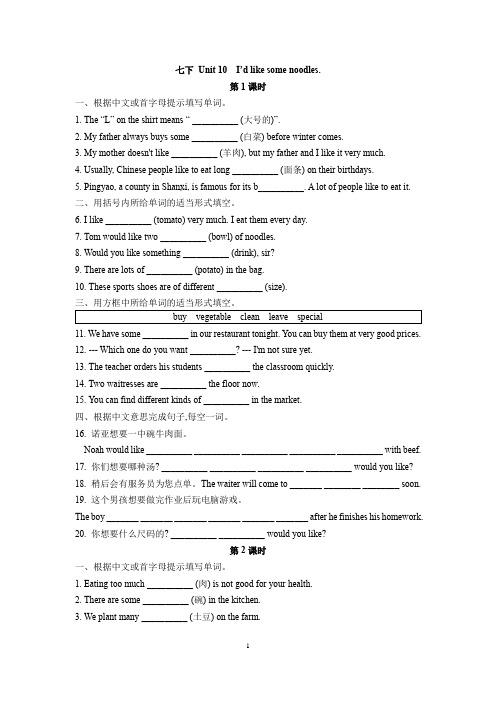
七下Unit 10 I’d like some noodles.第1课时一、根据中文或首字母提示填写单词。
1. The “L” on the shirt means “ __________ (大号的)”.2. My father always buys some __________ (白菜) before winter comes.3. My mother doesn't like __________ (羊肉), but my father and I like it very much.4. Usually, Chinese people like to eat long __________ (面条) on their birthdays.5. Pingyao, a county in Shanxi, is famous for its b__________. A lot of people like to eat it.二、用括号内所给单词的适当形式填空。
6. I like __________ (tomato) very much. I eat them every day.7. Tom would like two __________ (bowl) of noodles.8. Would you like something __________ (drink), sir?9. There are lots of __________ (potato) in the bag.10. These sports shoes are of different __________ (size).11. We have some __________ in our restaurant tonight. You can buy them at very good prices.12. --- Which one do you want __________? --- I'm not sure yet.13. The teacher orders his students __________ the classroom quickly.14. Two waitresses are __________ the floor now.15. You can find different kinds of __________ in the market.四、根据中文意思完成句子,每空一词。
最新最新人教版新目标英语七年级下十单元知识点归纳典型题练习及答案资料
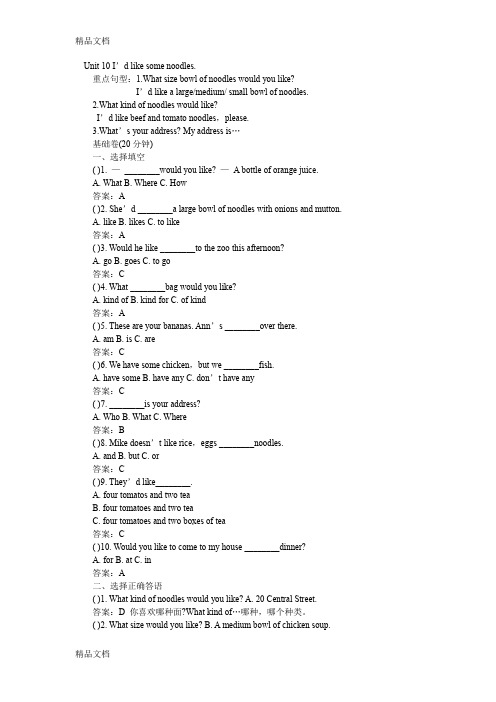
Unit 10 I’d like some noodles.重点句型:1.What size bowl of noodles would you like?I’d like a large/medium/ small bowl of noodles.2.What kind of noodles would like?I’d like beef and tomato noodles,please.3.What’s your address? My address is…基础卷(20分钟)一、选择填空( )1. —________would you like? —A bottle of orange juice.A. WhatB. WhereC. How答案:A( )2. She’d ________a large bowl of noodles with onions and mutton.A. likeB. likesC. to like答案:A( )3. Would he like ________to the zoo this afternoon?A. goB. goesC. to go答案:C( )4. What ________bag would you like?A. kind ofB. kind forC. of kind答案:A( )5. These are your bananas. Ann’s ________over there.A. amB. isC. are答案:C( )6. We have some chicken,but we ________fish.A. have someB. have anyC. don’t have any答案:C( )7. ________is your address?A. WhoB. WhatC. Where答案:B( )8. Mike doesn’t like rice,eggs ________noodles.A. andB. butC. or答案:C( )9. They’d like________.A. four tomatos and two teaB. four tomatoes and two teaC. four tomatoes and two boxes of tea答案:C( )10. Would you like to come to my house ________dinner?A. forB. atC. in答案:A二、选择正确答语( )1. What kind of noodles would you like? A. 20 Central Street.答案:D 你喜欢哪种面?What kind of…哪种,哪个种类。
2020人教版英语七年级下册Unit 10重点词汇、语法自测(附答案)
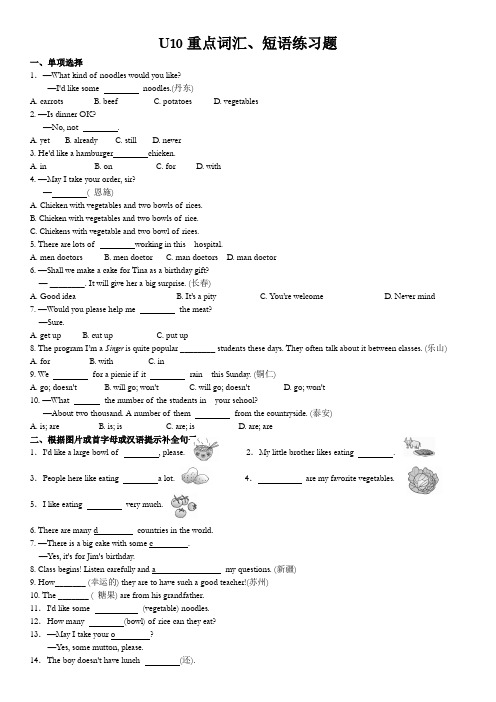
U10重点词汇、短语练习题一、单项选择1.—What kind of noodles would you like?—I'd like some noodles.(丹东)A. carrotsB. beefC. potatoesD. vegetables2. —Is dinner OK?—No, not .A. yetB. alreadyC. stillD. never3. He'd like a hamburger chicken.A. inB. onC. forD. with4. —May I take your order, sir?—( 恩施)A. Chicken with vegetables and two bowls of rices.B. Chicken with vegetables and two bowls of rice.C. Chickens with vegetable and two bowl of rices.5. There are lots of working in this hospital.A. men doctorsB. men doctorC. man doctorsD. man doctor6. —Shall we make a cake for Tina as a birthday gift?— ________. It will give her a big surprise. (长春)A. Good ideaB. It’s a pityC. You’re welcomeD. Never mind7. —Would you please help me the meat?—Sure.A. get upB. cut upC. put up8. The program I’m a Singer is quite popular ________ students these days. They often talk about it between classes. (乐山)A. forB. withC. in9. We for a picnic if it rain this Sunday. (铜仁)A. go; doesn'tB. will go; won'tC. will go; doesn'tD. go; won't10. —What the number of the students in your school?—About two thousand. A number of them from the countryside. (泰安)A. is; areB. is; isC. are; isD. are; are二、根据图片或首字母或汉语提示补全句子1.I'd like a large bowl of , please. 2.My little brother likes eating .3.People here like eating a lot. 4.are my favorite vegetables.5.I like eating very much.6. There are many d countries in the world.7. —There is a big cake with some c.—Yes, it's for Jim's birthday.8. Class begins! Listen carefully and a my questions. (新疆)9. How_______ (幸运的) they are to have such a good teacher!(苏州)10. The _______ ( 糖果) are from his grandfather.11.I'd like some (vegetable) noodles.12.How many (bowl) of rice can they eat?13.—May I take your o?—Yes, some mutton, please.14.The boy doesn't have lunch (还).15.The (特色菜) in this restaurant is only 5 yuan.16. He wants to travel ________ ________ ________ (世界各地) in the future.17. He could play the piano ________ ________ _________ ________ (在……岁时) 5.18. The birthday person can ________ ________ ________ (许一个愿) and ________ ________ (吹灭) the candles.19. It ________ ________ ________ (受欢迎) to have street dance(街舞).20. 制作香蕉奶昔的第二个步骤是将香蕉切碎。
- 1、下载文档前请自行甄别文档内容的完整性,平台不提供额外的编辑、内容补充、找答案等附加服务。
- 2、"仅部分预览"的文档,不可在线预览部分如存在完整性等问题,可反馈申请退款(可完整预览的文档不适用该条件!)。
- 3、如文档侵犯您的权益,请联系客服反馈,我们会尽快为您处理(人工客服工作时间:9:00-18:30)。
一、词汇拓展(1)special adj.特殊的;特别的n.特色菜;特价品→specially ad.特意地;专门地(2)different adj.不同的;有区别的→ difference n.区别;不同(3)luck n.运气;幸运→lucky adj.幸运的;运气好的→luckily adv.幸运地;运气好地(4)true adj.真实的;确实的→truly ad.真实地→truth n.真实;真相(5)worry v.担心;忧虑→ worried adj.担心的;着急的(6)child n.孩子;小孩→children a.孩子们;小孩二、短语归纳(1)would like 想要同want(2)beef and tomato noodles牛肉西红柿面(3)what kind of 什么种类的(4)the number of... ......的数量(5)orange juice 橙汁(6)order form订购表(7)four bowls of 四碗.……(8)make a wish 许一个愿(9)come true 实现;或为现实(10)blow out 吹灭(11)cut up切碎;切断(12)be short of 缺少;短缺(13)be popular with 受到……欢迎(14)all of..……中的全部(15)in one go一次,一口气同at a time(16)Can I help you?你要点什么吗?同What can I for you?(17).May I take your order?我可以给你点菜吗?(18)a large/big bowl of...一大碗......(19)what size bowl of...多大号碗的三、知识点fish(1)fish既可作可数名词,也可以作不可数名词。
用作可数名词指鱼的条数时,单复数相同。
例如:I bought two fish in the market.(2)fish用作可数名词指鱼的种类时,复数形式是fishes.例如:There are many kinds of fishes in the lake.(3)fish作不可数名词,意为“鱼肉”。
Do you like fish or eggs?你喜欢吃鱼肉还是鸡蛋?(4)fish 还可以作动词,意为“钓鱼”。
Let’s go fishing tomorrow. 让我们明天去钓鱼吧。
四、知识点special(1)special作名词时,意为“特色菜、特价品、特别的事物”等。
例如:The train is a special for the football game.The menu changes regularly and there are daily specials to choose from.(2)special还可以做形容词,意为“特殊的, 特别的,特色的”。
His accent is quite special.五、知识点order(1)order 作名词,意为“点菜”,是可数名词;词组take one’s order意为“点菜”。
例如:May I take your order?拓展:order 作名词时,还可以表示“顺序、次序”。
例如:The names are in alphabetical order.My mother likes order in our home.(2)order 作动词,意为“命令、要求、订购货物”等。
例如:The police ordered them to wait right there.Shall I order a taxi for you?六、知识点would like + sth. / to do sth. / sb. to do sth 想/想要/愿意…=want to do sth.---What would you like to drink? ---I’d like a cup of tea.She wouldn’t like to do that.I’d like you to go there with me.七、知识点blowblow 不及物动词,意为“吹”;词组blow out 意为“吹灭”。
后接名词时,名词可以放在词组的中间也可以放在out的后面;后接代词时,代词必须放在词组的中间。
例如:The wind blew out the candle. 风吹灭了蜡烛。
The wind blew the match out. 风把火柴吹灭了。
The wind blew it out. 风把它吹灭了。
八、知识点make sb. /sth. do sth. 意为“使某人做某事”。
make sth/sb+adj 意为“使/让某人(某物)怎么样”。
例如:The boss makes us work eleven hours a day.She often makes him happy.九、知识点a number of表示“许多……”+名词复数+谓语动词复数A number of students of our school have read that magazine.A number of wild animals have been found in the forest.the number of表示“……的数量”+名词复数+谓语动词单数。
The number of students in our school is 1,500.十、知识点what size 询问尺寸、大小,“多大尺寸,什么号码的”。
size 是名词,可以表示物品的大小、尺寸、号码。
1)---你要多大号码的鞋?---我要38码的。
---What size shoes would you like?---I’d like Size 38.2)这件T恤有点小,你能给我一件大号的吗?This T-shirt is a little small for me. Would you like to show me a larger size?十一、知识点语法:名词复数的变化规律一、名词复数的构成方法及读音规则1.一般情况加–s:例如:map—maps; drink—drinks; roof—roofs; park—parks; 例如:boy—boys; show—shows; zoo—zoos;panda — pandas; car —cars; singer—singers;例如:girl—girls; pen—pens; friend—friends; bag—bags; lab — labs; room —rooms;2.以s, sh, ch, x等结尾加–es, 如:bus—buses watch—watches box—boxes brush—brushesmatch—matches fish—fishes3.以辅音字母+y结尾,变y 为i,再加es。
例如:baby—babies; strawberry—strawberries country—countries; story—stories family—families; city—cities但以y结尾的专有名词,或元音字母+y结尾的名词变复数时,直接加s变复数。
two Marys the Henrysboy—boys; monkey— monkeys;play—plays; holiday—holidays4.以o结尾的名词,变复数时:1)无生命的加s, 如:photo---photos, zoo---zoos piano---pianos, radio---radios ;2)有生命的加es, 如:potato---potatoes, tomato---tomatoes, hero---heroes(英雄),5.以f或fe 结尾的名词变复数时:1)加s,如:belief---beliefs(信仰,信任)roof---roofs (房顶)scarf---scarfs / scarves (围巾)2)去f, fe 加ves,如:half---halves (半)knife---knives leaf---leaves wolf---wolveswife---wives life---lives(生命)thief---thieves shelf---shelves (架子)self---selves(自己)二、名词复数的不规则变化1.child---children,foot---feet,tooth---teeth, goose---geese(鹅),mouse---mice(小老鼠),man---men,woman---women,注意:由一个词加man 或woman构成的合成词,其复数形式也是-men 和-women。
an Englishman--two Englishmen。
但German不是合成词,所以复数形式为Germans.2.单复同形。
如:deer鹿,sheep 绵羊Chinese---Chinese; Japanese---Japanese3.集体名词,以单数形式出现,但实为复数。
people police cattle 等本身就是复数,不能说 a people(一个人),a police,a cattle;(但是可以有:a people : 一个民族)但在表达“一个…”时,可以说a person,a policeman,a head of cattle .4.以s结尾,仍为单数的名词,如:1)maths(英:数学),politics(政治),physics(物理)等学科名词,虽然后有-s,但是为单数形式。
2)news 为不可数名词。
3)the United States,the United Nations 视为单数。
4)以复数形式出现的书名,剧名,报纸,杂志名,也可视为单数。
例5.表示由两部分构成的东西,只有复数形式。
glasses; trousers; pants; shorts; shoes;compasses(圆规)scissors(剪刀)等,若表达具体数目,要借助数量词pair(对,双); suit(套)。
a pair of glasses “一副眼镜”;two pairs of trousers “两条裤子” 等。
6.另外还有一些名词,其复数形式有时可表示特别意思。
如:goods货物,waters水域,fishes(各种)鱼。
三、表示“某国人”的单复数变化:1.加-s的词:German---Germans (德国人)Russian---Russians(俄罗斯人)Roman---Romans (罗马人)American---AmericansArab---Arabs (阿拉伯人)2.有变化的词有:Frenchman---Frenchmen; Englishman-Englishmen四、合成名词变为复数时:1.第一个或最后一个词变成复数。
